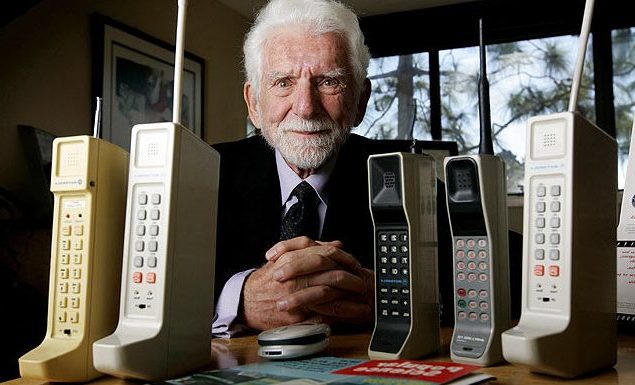The creator of the first smartphone in history tells users to "get a life" because he is astounded by how much time people currently squander on their gadgets. Martin Cooper, 92, made the statement in response to a co-claim host's that she spent more than five hours each day on her phone during an appearance with "BBC Breakfast."
Do you truly? Really, how long do you spend each day? He said, "Get a life!" and then started laughing. Chicago-based Cooper created the Motorola DynaTAC 8000X, the first cellphone ever made in 1973.
The engineer had spent more than twenty years working for Motorola and was dissatisfied with the rise in popularity of vehicle phones. "People have spent more than a century being linked to their workstations and kitchens, and now they're going to wire us to our automobiles, where we spend only 5% of our time?" Cooper remembered his thoughts during a recent interview.
Later, he had the thought to create a portable phone that people could carry into their car as well as remove and use while they were out and about performing errands. He imagined the cellphone's design before concentrating on its internal workings, saying he wanted it to be "compact enough to fit in your pocket, but big enough so that it could go between your ears and your lips."
Cooper considered this to be his “greatest accomplishment.” since he wanted everyone to have their own phone number. Prior to then, phone numbers were connected to specific locations, such as a home, car, or desk.
Given that they had previously utilized similar technology to construct police radios, Cooper and his team just needed three months to construct the phone after Motorola invested millions of dollars in their project.
When it was finished, the gadget was given the name Motorola DynaTAC 8000X. It was 10 inches long and 2 12 pounds in weight. It only had a battery life of 25 minutes and needed a whopping 10 hours to recharge.

Cooper made the first-ever cellphone call on April 3, 1973, choosing to call his rival Joel Engel, an AT&T head engineer at the time. Cooper called Engel's landline while the event went occurring in front of reporters in the open air in Midtown Manhattan.
"Marty, this is Joel. The reporters stared in awe as he said, "I'm calling you from a cellphone, a real handheld portable mobile. After another ten years, the phone was ultimately made available to the general public in 1983. Its steep price was $3,995.
In his 2021 memoir "Cutting the Cord," Cooper wrote about creating the telephone. It might be turned into a film.
Nearly all of us are dependent on these devices today, some 50 years after Cooper's invention. 46 percent of respondents to a Statista survey of 2,028 Americans in 2021 reported spending five to six hours a day on their phones. A startling seven hours or more were spent on devices by 11% of respondents.
Obviously smartphones have made our lives easier and more comfortable. It provides us with unimaginable information and data. Most of the information we need is literally at the tip of our fingers! It empowers us in various ways. It is truly a great and life-changing invention.
At the same time, it is sad the in spite of the possibility of instant communication, human beings have not become closer. We have not learnt to look at each other as brothers and sisters. We have not learnt wisdom from our marvellous technological advancements.

This reminds us of what American poet Thomas Stearns Eliot (1888-1965) wrote in his famous poem “The Rock” in 1934. He writes: “Where is the Life we have lost in living?/Where is the wisdom we have lost in knowledge?/Where is the knowledge we have lost in information?”
So we can ask: Have we become happier? Wiser? More helpful to the others? In this context, for a Christian, we need to learn with hope and peace, from Elliot, the relation between stillness, words, Word, death, dust and God, as he writes elegantly in the same poem.
The endless cycle of idea and action,
Endless invention, endless experiment,
Brings knowledge of motion, but not of stillness;
Knowledge of speech, but not of silence;
Knowledge of words, and ignorance of the Word.
All our knowledge brings us nearer to death,
But nearness to death no nearer to God.
Where is the Life we have lost in living?
Where is the wisdom we have lost in knowledge?
Where is the knowledge we have lost in information?
The cycles of heaven in twenty centuries
Brings us farther from God and nearer to the Dust.
As Christians, we can never cut our deepest chord to God, who is closer to us than we are to ourselves. Therein lies our hope, in spite of everything that threatens us!
Click here to read other articles of the author